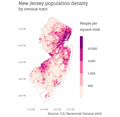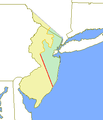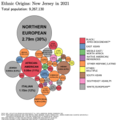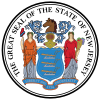Portal:New Jersey
The New Jersey Portal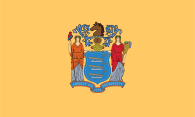 New Jersey is a state situated within both the Mid-Atlantic and Northeastern regions of the United States. It is the most densely populated of all 50 U.S. states, and is situated at the center of the Northeast megalopolis. New Jersey is bordered on its north and east by New York state; on its east, southeast, and south by the Atlantic Ocean; on its west by the Delaware River and Pennsylvania; and on its southwest by Delaware Bay and Delaware. At 7,354 square miles (19,050 km2), New Jersey is the fifth-smallest state in land area, but with close to 9.3 million residents as of the 2020 United States census, its highest decennial count ever, it ranks 12th in population. The state capital is Trenton, and the state's most populous city is Newark. New Jersey is the only U.S. state in which every county is deemed urban by the U.S. Census Bureau with 13 counties included in the New York metropolitan area, seven counties in the Philadelphia metropolitan area, and Warren County, part of the heavily industrialized Lehigh Valley metropolitan area. New Jersey was first inhabited by Paleo-Indians as early as 13,000 B.C.E., with the Lenape being the dominant Indigenous group when Europeans arrived in the early 17th century. Dutch and Swedish colonists founded the first European settlements in the state, with the British later seizing control of the region and establishing the Province of New Jersey, named after the largest of the Channel Islands. The colony's fertile lands and relative religious tolerance drew a large and diverse population. New Jersey was among the Thirteen Colonies that supported the American Revolution, hosting several pivotal battles and military commands in the American Revolutionary War. On December 18, 1787, New Jersey became the third state to ratify the United States Constitution, which granted it admission to the Union, and it was the first state to ratify the U.S. Bill of Rights on November 20, 1789. (Full article...) Selected article -
George Washington's crossing of the Delaware River, which occurred on the night of December 25–26, 1776, during the American Revolutionary War, was the first move in a surprise attack organized by George Washington against the Hessian forces in Trenton, New Jersey on the morning of December 26. Planned in partial secrecy, Washington led a column of Continental Army troops across the icy Delaware River in a logistically challenging and potentially dangerous operation. Other planned crossings in support of the operation were either called off or ineffective, but this did not prevent Washington from successfully surprising and defeating the troops of Johann Rall quartered in Trenton. The army crossed the river back to Pennsylvania, this time burdened by prisoners and military stores taken as a result of the battle.
Washington's army then crossed the river a third time at the end of the year, under conditions made more difficult by the uncertain thickness of the ice on the river. They defeated British reinforcements under Lord Cornwallis on January 2, 1777, and defeated his rear guard at Princeton on January 3, before retreating to winter quarters in Morristown, New Jersey. Selected picture - Credit: Decumanus Newark Bay is a bay of New York Harbor formed at the confluence of the Passaic and Hackensack rivers. On its south end, it is connected to Upper New York Bay by the Kill Van Kull, as well as to Raritan Bay by the Arthur Kill. It contains the Port Newark–Elizabeth Marine Terminal. New Jersey news'Related portalsSelected biography -Thomas Woodrow Wilson (December 28, 1856 – February 3, 1924) was an American politician and academic who served as the 28th president of the United States from 1913 to 1921. A member of the Democratic Party, Wilson served as the president of Princeton University and as the governor of New Jersey before winning the 1912 presidential election. As president, Wilson changed the nation's economic policies and led the United States into World War I in 1917. He was the leading architect of the League of Nations, and his progressive stance on foreign policy came to be known as Wilsonianism. Born in Staunton, Virginia, Wilson grew up in the Southern United States, mainly in Augusta, Georgia, during the American Civil War and Reconstruction era. After earning a Doctor of Philosophy (Ph.D.) in history and political science from Johns Hopkins University in Baltimore, Wilson taught at several colleges prior to being appointed president of Princeton University in Princeton, New Jersey, where he emerged as a prominent spokesman for progressivism in higher education. (Full article...)Did you know? -
General imagesThe following are images from various New Jersey-related articles on Wikipedia.
TopicsQuality content
CategoriesThings you can do
For more information on how you can help, see the WikiProject New Jersey. Associated WikimediaThe following Wikimedia Foundation sister projects provide more on this subject:
Discover Wikipedia using portals |
- Portals with triaged subpages from October 2020
- All portals with triaged subpages
- All portals
- Portals with no named maintainer
- Random portal component with over 50 available subpages
- Random portal component with more available subpages than specified max
- Random portal component with 16–20 available image subpages
- Random portal component with 11–15 available subpages
- United States portals by state or territory
- New Jersey
- WikiProject New Jersey











